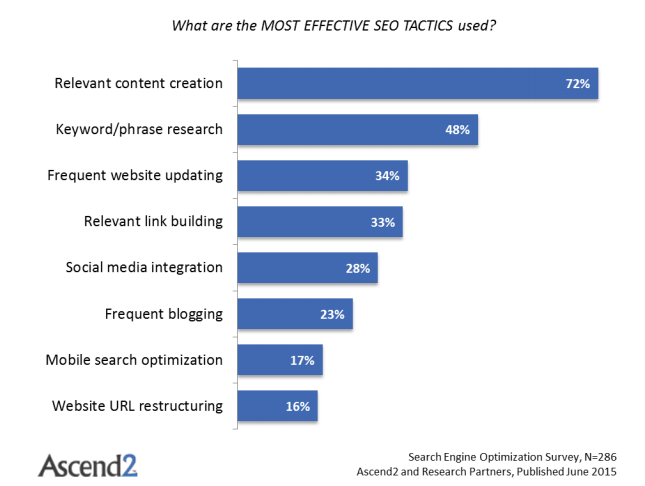Why Content Marketing Really Matters?
Since search engines strive to be reliable and provide trustworthy information
The internet has become a number one source of information for us. Regardless if you want to know how long should you cook broccoli, where the nearest Italian restaurant is, or which movie you should watch this evening, the information is easily found on the internet.

The internet has become a number one source of information for us. Regardless if you want to know how long should you cook broccoli, where the nearest Italian restaurant is, or which movie you should watch this evening, the information is easily found on the internet. With over 3.5 billion searches per day on Google alone (Source), we see that the internet actually represents a giant pool of information retrieved from huge amount of content uploaded online each day.
Since search engines strive to be reliable and provide trustworthy information, the importance of content has never been greater. There is only one first page of search engine results, and search engines get to decide which websites will take this honorable place. One of the main criteria in selecting the chosen few is content, but not just any content. It needs to be relevant, of high quality, reliable and trustworthy. Hence we have content marketing that emerged as a part of online marketing focused on creating content that will achieve that ultimate purpose – rank your website high up in the search engine result pages.
Even Bill Gates predicted the importance of content back in 1996, but when it comes to modern online marketing and strategies that are available to you, here is why content marketing really matters.


Content marketing and SEO
If your business is oriented towards online promotion and connection with online users, you’re already familiar with the concept of SEO, as the process of optimizing your website in the purpose of being positioned high up in the search engine result pages. The concept of search engine optimization has been evolving as the amount of content and active internet users grew. Search engines needed to adapt to this changing environment and develop an approach that would filter the results in a way that benefits online users. When you create a website, it’s natural to wish for it to be shown first, when relevant keywords are entered in the search field, but this has never been more difficult than nowadays, as search engines filter the results using complex algorithms. In order to reach this goal, you need content, which ultimately helps search engines to identify your website with a specific keyword(s). Therefore, positioning as a part of SEO has become closely related to content creation as a strategy. In fact, “creating relevant content is the most effective tactic used by 72% of SEO marketers”.
Source: http://ascend2.com/home/wp-content/uploads/SEO-Survey-Summary-Report-150609.pdf
It has been confirmed by Google that content signals and link signals are two metrics that help Google evaluate the worthiness of a website, so the question no longer is IF Google takes into account content as a metric to rank websites, but the question is HOW Google analyzes and evaluates content. As pointed out in Rand Fishkin’s episode of Whiteboard Friday, there are a couple of factors that could be indicators to Google if your content is in fact of great value, and as such worthy of being shown in the search engine results:- Keyword matches
- Topic association
- Content structure (length, format, etc.)
- Brand name, site name, etc.
- Visuals and non-text content
- Accuracy/validity of information
- Phrase and sentence structure
Content marketing and social media
It’s undeniable that social media has tremendous influence on online exposure, hence the importance of establishing a presence on different social networks has become imperative for business, not only when it comes to promotion, but when it comes to increasing sales as well. In order to get credibility on social media and to establish yourself as an influencer or a brand, you need to provide relevant, high-quality content, and this is where content marketing comes into play, as a part of online marketing strategy focused on developing different types of content that is supposed to engage online users. Unlike with SEO, where the content is dissolved through the website, with social media, content should be designed to be distributed through different social media platforms. Ultimately, this means that due to the nature of social networks, content is more focused on visual aspect than content used to improve SEO. Let’s say you own a bakery and you want to use social media to promote your business. The type of content you could benefit from, when it comes to social media promotion, are photos of your products or short videos illustrating a process of decorating cupcakes, for example. If you sell sports gear, you will need a lot of photos of the products you’re selling, etc. Of course, regardless of the industry, you could always use social media to promote content that has already been shared on your blog. The following article is a great additional resource on types of content that will help with social media strategy and taking your social media marketing to a next level: The 6 Types Of Social Media Content That Will Give You The Greatest Value Conclusion: Content creation based on your business goals provides creative input for social media activity, giving you the resources needed to engage and convert online users into customers.
Image source: https://unsplash.com/
Content marketing and email marketing
Email marketing still holds an important place in the overall company’s strategy to reach and communicate with online customers, which is why it’s important to refine and reshape email marketing strategy in order to get the most out of it. In this sense, content marketing again has a role of a segment that will provide engaging and useful content that boosts the power of email marketing. Different types of content can be repurposed to fit the style of your newsletter. You need to reshape your content with your email subscribers in mind, meaning you still have to keep your style and layout of the email message, but sharing content that matters this way helps you engage subscribers, encourage clicks and eventually get your message across. The goal of content marketing in this case is to create content that is of high quality, genuine and represents your brand, but it needs to be adapted to the email campaign features in order to maximize the gain through this type of communication. Written content and images are the most popular types of content used in this purpose, but it’s always a great idea to link to your blog or website as a reference, in order to encourage clicks and get the email recipients to the landing page. Use content to share the news, to educate and to provide helpful tips to your subscribers, as this kind of content is the only guarantee that your emails will still be read, instead of being marked as spam. If you’d like to check out even more tips on email marketing powered by content marketing, take a look at this article: 10 Email Marketing Tips for Content Marketers. Conclusion: Content marketing helps you create content you can share through email marketing campaigns. Together, these lead you to achieving your company’s goals – engaging users and increasing conversions.Content marketing and online users
Finally, we get to the users, who are in fact the central point of content marketing. The content you create, regardless of the type of content and the platforms you use to distribute it, should be designed with the online users in mind. You need to be able to predict what online users would need or want in order to reach them and persuade them that you’re the one they should work with, in terms of sale, hiring services, etc. However, the term “online users” itself is quite broad, as it includes all the people using the internet. When we consider online users in terms of content marketing, we refer to your target audience. This is a specific group of people that could potentially be interested in your business. Your target audience is usually defined by certain criteria, such as age, location, interests, occupation, etc. For example, in case you own a gym for men in central London, your target group could be men between 18 and 50 years old who live in central London. All of these characteristics, narrow down the group of people, in order for you to define a group of people you want to target. In content marketing, defining a target group is very important, as you create content with your target group in mind. You need to create content that uses the language and solves the problems of your target group, rather than creating content that would appeal to everyone. Narrowing down your perspective and focusing on fulfilling the needs of the specific users who could potentially become your customers in the future is the best way to get the most out of content marketing. Today’s consumers are strongly interested in looking for information online. Most of purchases and hiring services start online, where the users browse the internet in search for recommendation, comparison, detailed instructions and description, etc. Since the online world has become overflooded with paid advertising and sponsored posts, consumers want to see more useful articles and content that can help them make a decision. This means that a company has much more success at reaching online consumers through useful, quality content than using paid advertising options. Content marketing is tailored to your target group and as such it has much more success at resonating with the potential customers. By satisfying a need of an online consumer through powerful content, you are also building a relationship that is founded on trust and confidence, rather than using promotional approach. Conclusion: When creating content, have in mind the online users, how you can help them, how you can solve their problem, how you can answer the question they have. This way your content fulfills all the requirements of quality content.Why content marketing matters to your business?
Finally, we get to the point where we want to highlight the importance of content marketing for your business. Sure, your business indirectly benefits from content marketing through SEO and social media, but there are a few more benefits that directly help you set your business apart from the competitors, and those are:- Personalization
- Trustworthiness
- Authority
